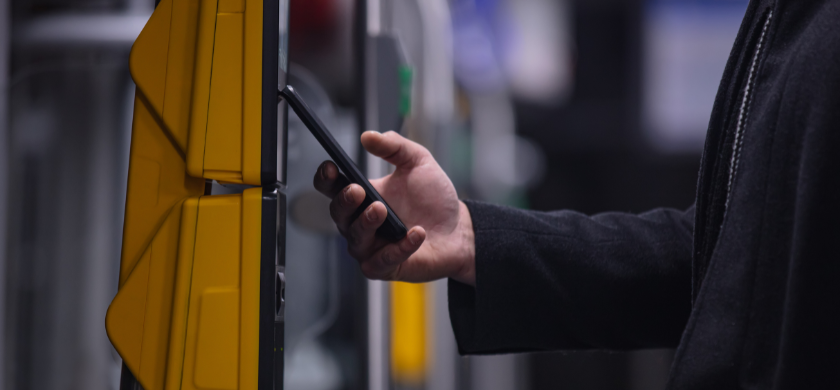Stadium Internet, Device, and Food Trends That Will Define 2025
As technology keeps evolving, stadiums remain at the forefront of technological innovation; Deloitte predicts that over 300 global sports stadiums will have begun renovations or new builds in 2025. Even without full renovations, stadium-owners must stay up on trends to keep fans satisfied. We’ve gathered some of the most essential stadium trends — for both 2025 and beyond.
- Social Media Integration
- Stadium Concessions Apps
- Mobile Ticketing
- Wearable Devices
- Sustainable Technology
- In-Game IoT Integration
- Event Live-Streaming
- Stadium WiFi Management
1) Social Media Integration
Sports and social media have become inherently, increasingly entwined. Take, for example, the 2024 Paris Olympics; the event boasted more than 12 billion engagements across Olympics social media handles, over double the number of engagements of Tokyo 2020.
With so many eyes online, stadiums need to comprehensively integrate social media — within both marketing and their venues.
Stadiums should maintain active social media accounts across platforms such as Instagram, Facebook, and X. Accounts can feature all kinds of content — from showcases of specific stadium features to real-time game updates.
Then, during events, stadiums can feature opportunities for fan social media engagement throughout their venue, leading to real-time online engagement and increases in impressions.
2) Stadium Concessions Apps
Concession apps streamline food ordering during events to help ensure fans maximize their stadium experience. Stadiums can leverage different services within these apps depending on their resources and operability; while one venue may opt to implement a full food delivery service, others may focus on solutions such as online ordering or contactless menu access.
However they’re implemented, stadium concession apps significantly cut down on time spent ordering food — enhancing fan experiences both at concession stands and in their seats.

3) Mobile Ticketing
Mobile ticketing is increasingly becoming the rule, rather than the exception. According to Arival, 34% of U.S. travelers book events via their smartphone or tablet — more than any other individual form of booking. As event attendees continue to adopt the technology, stadiums need to prepare their infrastructure for holistic mobile ticket integration. This technology comes with substantial benefits for varied members of a stadium’s ecosystem.
Attendees nearly always have access to a mobile device, minimizing the risk of arriving at an event without their ticket. Plus, once they arrive, mobile ticketing makes stadium entry more efficient — leading to less lines and more time for stadium experiences.
Smaller lines means fewer necessary staff for ticketing; combined with automated sales tracking & analytics, mobile ticketing optimizes events for stadium employees and fans alike. With so many benefits and such widespread acceptance, mobile ticketing isn’t a trend — it’s a necessity.
4) Wearable Devices
Whether permanent or disposable, wearable devices make fans themselves feel like part of the stadium experience. Disposable LED wristbands can be implemented across diverse events — from stunning visuals during emotional concerts to vibrant clusters of light to amping up players as they storm the field.
More permanent wearable devices — such as smartwatches and smart glasses — can even be implemented with other notable technology trends such as mobile ticketing, social media, and stadium concessions apps.
5) Sustainable Technology
Eco-friendly solutions have become a priority across all industries — with the green technology and sustainability market size valued at USD 20.9 billion in 2024 — and stadiums are no exception. Sustainable stadium technology can take disparate forms; some of the most effective solutions include:
Automated facilities management, minimizing unnecessary energy consumption in bathrooms, kitchens, and other high-use areas.
Renewable energy sources such as wind, solar, and hydro power.
Overall waste reduction via integrated tracking, lowering instances of over-ordering disposables and perishables.
By implementing these and other sustainable solutions, stadiums can both entice guests with eco-friendly marketing and waste less money on unnecessary, wasteful expenditure.
6) In-Game IoT Integration
Stadium technology doesn’t just benefit fans and staff; coaches and players alike can leverage IoT technology to create integral efficiencies during a game. Via IoT technology integration, teams can access:
Real-time digital cameras for instant analysis of on-field strategy and execution.
Integrated injury treatment using high-tech databases of electronic medical records.
Wearable fitness technology to track individual player performance and health during games.
Better performance from teams leads to better event enjoyment for attendees and greater stadium revenue — meaning these in-game IoT integrations provide value to teams, employees, and fans alike.
7) Event Live-Streaming
For as long as stadiums have existed, recording sporting events has been an integral part of stadium infrastructure. From radio broadcasts to modern live-streaming, fans at home are always looking for ways to enjoy their teams even if they can’t make it in person. Modern live-streaming technology makes delivering these experiences to fans even easier.
Modern streaming technology includes internet-connected cameras, high-quality audio equipment, and intuitive streaming software. Depending on the event, stadiums can opt to leverage a free stream with ads, or have users pay for stream access. Either way, live-streaming is an excellent way to increase supplemental stadium revenue with technology.
8) Stadium WiFi Management
One thing all of these smart stadium solutions have in common? A need for responsive, reliable connectivity to keep them functional. Stadium WiFi installation helps ensure venue-wide access across diverse devices such as smartphones, employee computers, and high-speed cameras. Such comprehensive WiFi access, however, is easier conceptualized than implemented; working with a trusted provider is key.

Build Infrastructure That Supports Innovative Stadium Experiences With Hospitality Network
A trusted name in hospitality connectivity for over 40 years, Hospitality Network provides dynamic WiFi networks to venues across the hospitality industry — including some of the world’s most cutting-edge stadiums. Our networks provide a backbone for supporting the latest and greatest in stadium trends, while establishing a foundation for future solutions. Contact us today and learn how we can foster exciting new experiences in your stadium.

